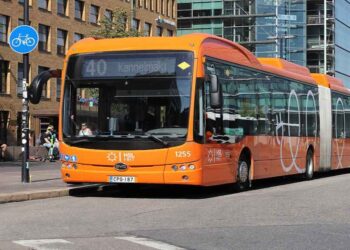Chicago City Council has announced that it has passed the Smart Streets Pilots Ordinance, a new measure establishing two downtown pilot programmes that aim to improve traffic safety, enhance protections for pedestrians and bicyclists and speed up public transportation.
The ordinance, which had been introduced in January 2023, will allow the city to use existing infrastructure and new technology to enforce parking violations, such as cars parked in bike lanes, bus-only lanes, bus stops and pedestrian crossings, and enable camera-based management of parking in commercial loading zones.
“The passage of this ordinance is an exciting step toward a safer and smarter transportation system,” said Mayor Lori E. Lightfoot. “While we continue to deepen our robust investments in infrastructure improvements, these pilot programmes give us another tool in our toolbox to improve safety for pedestrians and bicyclists, as well as speed up our bus network.”
The Smart Streets Pilots will encourage safer driver behaviour and better parking compliance with the goal of reducing crashes and pedestrian and cyclist fatalities, while also ensuring that Chicago’s growing network of bike lanes and bus lanes are working to their full potential.
Similar programmes exist in cities around the country, including those already operational in New York, San Francisco and Seattle — and those actively in the planning stages in Los Angeles and Washington D.C. The pilots will operate until June 2025 within the boundaries of Lake Michigan to Ashland Avenue and from North Avenue to Roosevelt.
Smart Streets Pilot
Of the two, the first pilot authorises the city to ticket registered vehicle owners by mail for various infractions, in order to help discourage drivers from illegally parking in places that vulnerable road users — people walking, biking, rolling and taking transit — in dangerous situations.
This pilot will also promote a more reliable, efficient and accessible bus service by deterring drivers from parking in bus-only lanes or at designated bus stops. Chicago’s growing bus priority network is key to combating congestion, providing equitable rapid transit and lowering emissions.
The ordinance allows for cameras to be fixed on city poles or city or Chicago Transit Authority (CTA) vehicles. Once data is collected, it will be individually reviewed and then sent to the Department of Finance (DOF) to be processed.
“The Smart Streets Pilots will help keep our streets safe and our bus-lanes moving,” said Chicago Department of Transportation (CDOT) Commissioner Gia Biagi. “By deterring drivers from illegally parking in bike lanes, bus-only lanes, bus stops and crosswalks, we create better streets for all road users.”
“CTA continues to partner closely with CDOT to advance bus priority on our streets,” said CTA President Dorval R. Carter Jr. “Our buses equitably serve all neighbourhoods in Chicago, and their reliability and speed impacts half a million riders each day.”
Smart Loading Zone Pilot
This second pilot will use license plate reading camera technology to facilitate more efficient driver or company payment within commercial loading zones designed for the loading and unloading of commercial vehicles. The pilot aims to prevent double-parking that puts drivers, bicyclists and pedestrians in unsafe conditions; decrease vehicle idling; reduce emissions; and create a more efficient system for payment and drop-offs for commercial drivers.
“The Smart Streets Pilots Ordinance is a strong step forward to ensuring that sustainable and equitable forms of transportation, such as buses and cycling, are safer and more efficient,” said Darlene Hightower, President and CEO of the Metropolitan Planning Council.
“Under Healthy Chicago 2025, Chicago’s five-year plan to close the racial life expectancy gap by addressing the root causes of health, CDPH is working toward a Chicago where all neighbourhoods promote optimal health and well-being. We are excited about this pilot program, which brings new tools to make our streets and sidewalks safer for bus riders, bikers, and drivers,” said Dr. Allison Arwady, Commissioner of the Chicago Department of Public Health (CDPH).
>>>


































